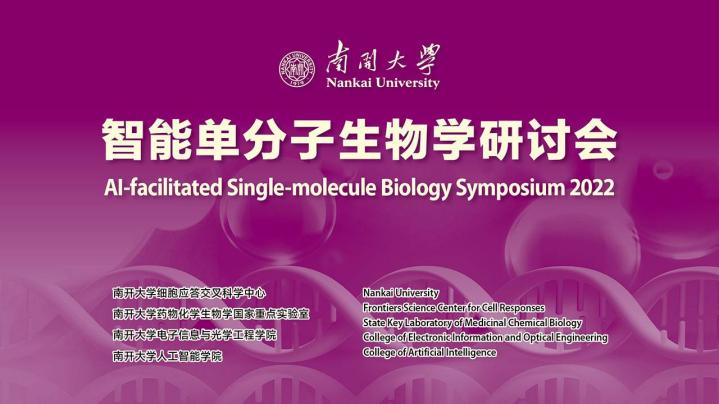From August 6 to August 9, the international conference "Workshop on AI-facilitated Single Molecule Biology", jointly sponsored by the Interdisciplinary Center for Cellular Response Science, the State Key Laboratory of Medicinal Chemical Biology, College of Electronic Information and Optical Engineering, and College of Artificial Intelligence, Nankai University, was held in the 7th Conference Room of the Tianjin Scientists & Engineers Club. The workshop was held online and offline in strict accordance with the relevant epidemic prevention and control policies. The conference was streamed on Zoom, Tencent Meeting, and Bilibili Research Cloud. The workshop, attended by a total of 21 well-known domestic experts and 3 foreign scholars, was held sequentially over three days, attracting an average of 18,000 online viewers per day.
The opening ceremony was presided over by Prof. Guo Xuefeng, Secretary General of the Single Molecule Biology Academic Subgroup of the Biophysical Society of China, who delivered the opening speech, and Prof. Yu Zhongbo from the State Key Laboratory of Medicinal Chemical Biology delivered the welcome speech. Subsequently, Zhao Xin, Dean of NKU College of Artificial Intelligence, and Chen Quan, Director of the Interdisciplinary Center for Cellular Response Science, Director of the State Key Laboratory of Medicinal Chemical Biology, and Dean of College of Life Sciences, Nankai University delivered a speech.
The conference saw extensive and in-depth discussion focusing on the latest advances and research results covering single molecule biology technologies, interdisciplinary cooperation, advantages and potential of artificial intelligence algorithms, application and development of self-developed and built precision instruments, and other topics. Professor Terence Strick from CNRS, Professor Nynke Dekker from Delft University of Technology, Professor Gijs Wuite from Vrije University Amsterdam, Professor Yan Jie from the National University of Singapore, Professor Long Mian from the Institute of Mechanics, Chinese Academy of Sciences, and Professor Guo Xuefeng from Peking University made representative reports on their achievements. Experts from Tsinghua University, Peking University, Chinese Academy of Sciences, University of Macau, University of Electronic Science and Technology, Nanjing University, Southern University of Science and Technology, and Tianjin University also delivered important study reports.
The State Key Laboratory of Medicinal Chemical Biology leads the way in interdisciplinary sciences in Nankai University, and the College of Electronic Information and Optical Engineering and the College of Artificial Intelligence of Nankai University are also exploring the potential for interdisciplinary research in biology and developing intelligent application scenarios. In order to strengthen the communication between scientists in many interdisciplinary fields of intelligence, electronic information and optical engineering, and medicinal chemical biology, the conference made full use of existing scientific and technological methods and academic hot topics in order to promote the development and improvement of interdisciplinary research. The meeting also advanced and facilitated the generation and development of research in related fields, which effectively motivated the exchange and integration of multiple disciplines and different methods. The conference aimed to promote academic exchange and cooperation, sharing of achievements, integration of new innovations, and communication of insights and ideas in the fields of artificial intelligence, electronic information and optical engineering, precision instrumentation and single-molecule biology. The goal is to provide a broad scientific platform for integrating the strengths of the different schools, and to address the limitations of development and bottlenecks encountered in related fields at home and abroad, thus creating new interdisciplinary technologies and methods in a more scientific, systematic and improved way. This interdisciplinary cooperation should prove favourable for national strategic scientific and technological strength.


